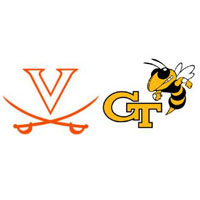
And I mean that literally. The ‘Hoos started 2014 with an impressive 4-2 start that included wins over Louisville and Pitt, and even the two losses that followed, a 20-13 decision at Duke two weeks ago, and last week’s 28-27 meltdown against UNC, were at least competitive.
Virginia was nowhere near competitive on Saturday in Atlanta, on the field or in the game preparation.
For whatever reason, offensive coordinator Steve Fairchild, surveying a Georgia Tech defense that came into the game 12th in the ACC against the rush, giving up 189.1 yards per game and 5.4 yards per carry, devised a game plan that had his offense run just 11 times in the first half while having starting quarterback Greyson Lambert chuck it 22 times.
If Lambert was more efficient at playing the quarterback position, this could make sense, but the embattled signal-caller is far from efficient or anything resembling comfortable in his role, and that showed in the middling 13-for-22, 168-yard performance in the first half, and the two third-quarter interceptions in Georgia Tech territory, one in the end zone, that snuffed out any chance that his team had to get back into the game.
Meanwhile, the Virginia defense, one of the best in the country against the run, giving up 100.4 yards per game and 3.0 yards per carry, seemed utterly unprepared not only for the Georgia Tech triple-threat option, but for Tech quarterback Justin Thomas. Thomas doesn’t throw much, but when it does, Thomas is quite efficient through the air, with a 154.96 passer rating, second in the ACC.
Thomas threw for 104 yards on his first four passes, and the Yellow Jackets led 21-7 one play into the second quarter with three TDs on its first three offensive series.
The UVA D got better from that point on, but the die had already been cast by that point.
Virginia was never in this one, which is surprising given how competitive the team had been all season long. Even in the opener against then-seventh-ranked UCLA, down 21-3 in the second quarter, with the Bruins getting three defensive touchdowns to race out to the big lead, the Cavs made a game of it, getting the ball into the red zone down a score in the fourth quarter before a fourth-down play came up short.
Everybody in Wahoo Nation outside of Bryant Hall thought going into this one that London’s job status is very much on the line down the stretch in 2014. After a 4-8 finish in 2012 and a 2-10 debacle in 2013, it was widely assumed that Virginia needed to win at least six games in 2014 to show the requisite progress to justify giving London more time to rebuild.
The 4-2 start seemed to foretell much more than a six-win season, even with a tough second-half schedule, but now at 4-5, with games left next week at #2 Florida State, on Nov. 22 at home against suddenly-dominant Miami and then on Nov. 28 in Blacksburg at Virginia Tech, the writing seems to be on the wall.
There aren’t two wins left on the schedule. There’s likely not one win left on the schedule. Virginia can play well each of the next two weeks and enter Blacksburg the day after Thanksgiving 4-7, and even with the Hokies down themselves this year, at 4-5 as of this writing, Virginia Tech has won 10 in a row in the series, and it’s hard to imagine a Virginia win given that history and what’s going on present day.
The last thing for London to be able to hang his hat on was that he’d made his team more competitive. The showing at Georgia Tech is an indication of a program, from the coaching staff on down, that has thrown in the towel, and is readying itself for a change.
– Column by Chris Graham










